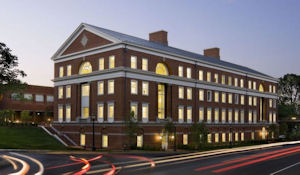
Bavaro Hall, Curry School of Education
by James A. Bacon
The University of Virginia’s Jefferson Education Accelerator will contribute to the creation of educational technologies and solutions by helping entrepreneurs test their ideas in the classroom, the Curry School of Education Foundation announced yesterday.
When word of the accelerator program first leaked out last year, the Curry School left its value proposition vague. The idea, as then described, was to create an accelerator/incubator to foster the start-up of enterprises that use technology to improve educational access and outcomes. The Curry School had given rise already to several entrepreneurial spin-offs such as PALS, CaseNex and Teachstone, and the thinking was that an accelerator could support even more.
In formally launching the accelerator yesterday, the Curry School of Education Foundation said it would provide more than office space and venture funding. Said Curry School Dean Robert Pianta, who will chair the Accelerator board:
Increasingly, schools of education have a responsibility to ensure that classrooms and campuses are equipped with tools that carry strong evidence of their effectiveness.
The Jefferson Education Accelerator is building a nationwide network of K-12 schools, colleges and universities that have demonstrated both an interest and capacity, to test promising products and services.
“Successful education technologies must be informed by the insights of teachers, administrators, and real-world implementation data,” said Accelerator CEO Bart Epstein. “The number one criterion for investing in education has to be efficacy. We want to bring transparency to the process of evaluating solutions—to help both educators and investors make better informed decisions and make an impact.”
Bacon’s bottom line: The project sounds well conceived. Raising capital and finding affordable space is the easy part of launching a new educational enterprise. The U.S. educational system is ponderous and bureaucratic. It resists innovation and change. Decision-making is diffuse. Failure is punished and success is little rewarded. Anyone seeking to introduce new technologies or services to schools would be well-served by testing innovations in real-world environments and providing social scientific support of efficacy. The Curry School’s accelerator addresses those challenges head-on.
There may be hope for American education yet.


